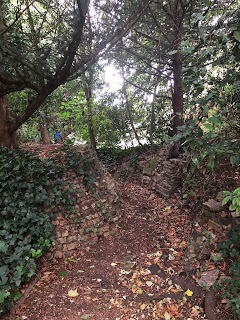I did not watch last night's Trump versus Biden debate. It's a whole different time zone over here. Instead I slept and had a nightmare in which I had a real, public meltdown about not having children. This will chill B.A.'s blood, but I think in the dream I was shouting at two of his female work colleagues.
"It's as if you could never go to university," I yelled at one.
"And it's as if you could never, ever go on holiday," I screamed at the other.
In real life both these women are childless, by the way, and apparently tranquil about it.
Anyway, that's the last time I look at the "pets available for rehoming" websites just before bed.
Sometimes I get chastised for promoting happy singleness because it seems anti-marriage to my critic. It can be difficult for people to understand that being a happy Single is key to attracting a potential spouse. It's a paradox. The happier you are as a Single, the more likely you are to get married--or to find the right religious order, if that is the life to which you are called. People like happy people.
Of course, you can't marry just anybody, which, by the way, my critics occasionally contest. For years I thought that the reason to promote the chaste Single state as an attractive way of life was to help women not marry the wrong man (e.g. the one whose attraction mainly lies in being the man most interested in you the week before your 25th birthday). Then I realised that another reason is to help women not marry when they are still the wrong woman.
Because there are serious implications to not marrying until you are in your late thirties, it would be a gift to Catholic women to sort out how to become the right woman (and find the the right man) in one's twenties. Naturally, a lot of women have this sorted in their twenties. The rest of us might be able to learn from them.
But to skip ahead to what makes a marriage last, I think a good origin story is very important. If the way you and your spouse met, or how you got married, is a heartwarming story, that story can get you through the rough times. "Origin story" is, I believe, an expression common to comic book fans. Historians might call it a "founding myth."
A myth is not necessarily fictional but it always conveys meanings and values. And I think this is why it is important for children to learn and love the foundational myths of their country. I'm not American, but I have enjoyed and admired the stories about the Pilgrims' First Thanksgiving, George Washington and the cherry tree, Betsy Ross and her flag, Johnny Appleseed, Paul Bunyan and the Blue Ox, and John Henry Born with a Hammer in his Hand. I am also edified by stories of the Civil War, in which thousands (including my own relations) died to end slavery in America, and the Civil Rights Movement of the 1960s.
I think people spit on those stories at their psychological and civil peril.
In case you are feeling sad about my nightmare and are worried that this sort of thing might happen to you, you should know that this is something which, in my experience, comes and goes. Whereas "what the heart doesn't know, it doesn't sigh for" doesn't apply, it is not at all like having lost a real, come-into-existence child. I will probably never know what that is like, which is a mercy.

























